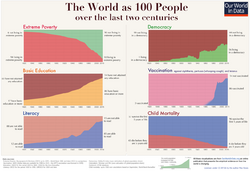Organization:Our World In Data
Our World In Data (OWID) is an online publication that presents empirical research and data that show how living conditions around the world are changing. The web publication on global development uses interactive data visualisations (charts and maps) to present the research findings on development that explain the causes and consequences of the observed changes. The aim is to show how the world is changing and why.
The publication is developed at the University of Oxford and authored by social historian and development economist Max Roser. It covers a wide range of topics across many academic disciplines: Trends in health, food provision, the growth and distribution of incomes, violence, rights, wars, culture, energy use, education, and environmental changes are empirically analysed and visualised in this web publication.
Covering all of these aspects in one resource makes it possible to understand how the observed long-run trends are interlinked. The research on global development is presented to the audience of interested readers, journalists, academics, and policy people. The articles cross-reference each other to make it possible for the reader to learn about the drivers of the observed long-run trends. For each topic the quality of the data is discussed and, by pointing the visitor to the sources, this website works as a database of databases – a meta-database.[1]
Our World In Data is made available as a public good:
- The entire publication is freely available,
- the data published on the website is available for download,
- all visualizations created for the web publication are made available under a Creative Commons license,
- and the tools to publish Our World In Data and to create the visualizations are free to use (available open source on GitHub).[2]
Our World in Data is currently financed entirely through small individual donations from readers of the publication.[3] The website is used widely in the media.[4] Authors like John Green and Steven Berlin Johnson use it for their work. It is used in teaching by economists, historians, and international development experts.[5]
Tina Rosenberg emphasised in The New York Times that Our World In Data presents a “big picture that’s an important counterpoint to the constant barrage of negative world news”. Steven Pinker placed Roser’s Our World In Data on his list of his personal “cultural highlights”[6] and explained in his article on 'the most interesting recent scientific news' why he considers Our World In Data so very important.[7]
References
- ↑ "About — Our World in Data". http://ourworldindata.org/about/.
- ↑ "OurWorldInData/our-world-in-data-grapher". https://github.com/OurWorldInData/our-world-in-data-grapher.
- ↑ "Save OurWorldInData.org". Archived from the original on 2016-03-09. https://web.archive.org/web/20160309110606/https://www.tilt.com/tilts/help-save-ourworldindataorg.
- ↑ "Media Coverage of OurWorldInData.org — Our World in Data". Archived from the original on 2015-11-04. https://web.archive.org/web/20151104060054/http://ourworldindata.org/media-coverage/.
- ↑ "Chris Blattman blog". http://chrisblattman.com/2016/01/25/links-i-liked-284/.
- ↑ Observer, Steven Pinker/the (2015-08-23). "On my radar: Steven Pinker’s cultural highlights" (in en-GB). The Guardian. ISSN 0261-3077. https://www.theguardian.com/culture/2015/aug/23/on-my-radar-steven-pinker-psychologist-author.
- ↑ "Human Progress Quantified – Edge answer by Steven Pinker". https://www.edge.org/response-detail/26616.
External links
- No URL found. Please specify a URL here or add one to Wikidata.


